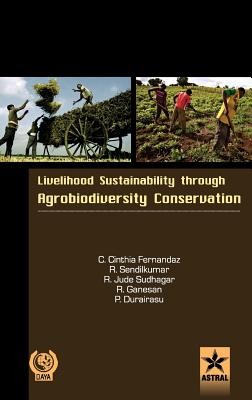
- We will send in 10–14 business days.
- Author: C Cinthia Fernandaz
- Publisher: Daya Pub. House
- ISBN-10: 9351302695
- ISBN-13: 9789351302698
- Format: 15.6 x 23.4 x 1.8 cm, hardcover
- Language: English
- SAVE -10% with code: EXTRA
Livelihood Sustainability through Agro-biodiversity Conservation- A Socio-Economic Study (e-book) (used book) | bookbook.eu
Reviews
Description
The world todays rounds behind the Biodiversity and its conservation. It has been realized that there is no life beyond biodiversity. This attempt on Livelihood Sustainability through Agrobiodiversity Conservation is to document and index the level of participation of the Tribal women in the conservation. The Nilgiris would be the apt place for the study. Participation of tribal women in agro biodiversity conservation and sustainable livelihood through agrobiodiversity conservation were considered as the dependent variables in the present study. Among the twelve components studied seven components influence the livelihood sustainability. These components were food sustainability, nutritional security, soil and water sustainability, economic sustainability and employment generation. The constraints were technological constraints, transfer of technology constraints, physical constraints, economic constraints, personal constraints and marketing constraints.
There were nearly twenty three suggestions among which providing timely environmental education was the foremost suggestion given by all the respondents. Hence awareness campaigns and exhibitions could be arranged to impart the importance of agrobiodiversity conservation. Training on recent technologies of agrobiodiversity conservation practices and knowledge on technological management were the other important suggestions. The empirical evidences from the study were taken to develop a module on environmental education for sustainable livelihood. It would be utilized for the various stakeholders such as school students, college or university levels and NGOs.
EXTRA 10 % discount with code: EXTRA
The promotion ends in 19d.02:16:55
The discount code is valid when purchasing from 10 €. Discounts do not stack.
- Author: C Cinthia Fernandaz
- Publisher: Daya Pub. House
- ISBN-10: 9351302695
- ISBN-13: 9789351302698
- Format: 15.6 x 23.4 x 1.8 cm, hardcover
- Language: English English
The world todays rounds behind the Biodiversity and its conservation. It has been realized that there is no life beyond biodiversity. This attempt on Livelihood Sustainability through Agrobiodiversity Conservation is to document and index the level of participation of the Tribal women in the conservation. The Nilgiris would be the apt place for the study. Participation of tribal women in agro biodiversity conservation and sustainable livelihood through agrobiodiversity conservation were considered as the dependent variables in the present study. Among the twelve components studied seven components influence the livelihood sustainability. These components were food sustainability, nutritional security, soil and water sustainability, economic sustainability and employment generation. The constraints were technological constraints, transfer of technology constraints, physical constraints, economic constraints, personal constraints and marketing constraints.
There were nearly twenty three suggestions among which providing timely environmental education was the foremost suggestion given by all the respondents. Hence awareness campaigns and exhibitions could be arranged to impart the importance of agrobiodiversity conservation. Training on recent technologies of agrobiodiversity conservation practices and knowledge on technological management were the other important suggestions. The empirical evidences from the study were taken to develop a module on environmental education for sustainable livelihood. It would be utilized for the various stakeholders such as school students, college or university levels and NGOs.


Reviews